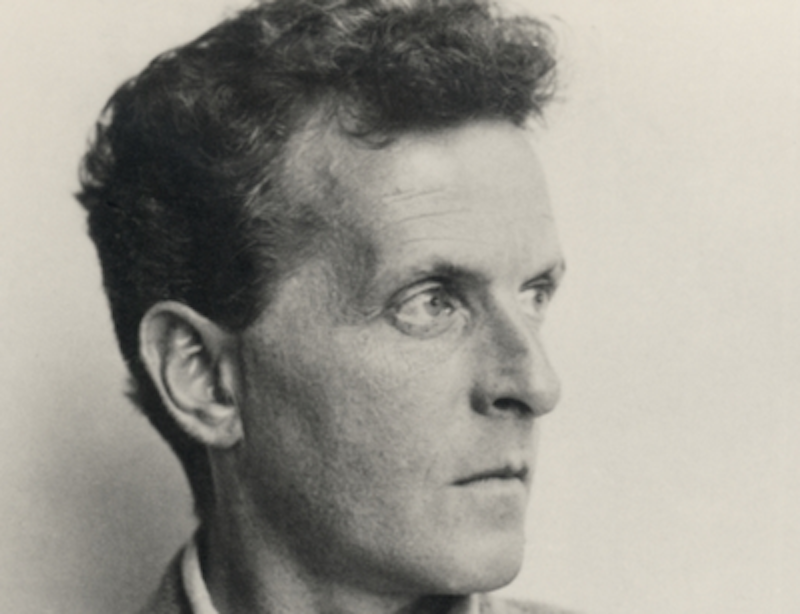Before he ever really thought of anything, Ludwig Wittgenstein was a genius. He was a genius in the golden era of genius, when mammoths bestrode the earth: he was a Picasso, an Einstein, a James Joyce. He based his persona on Beethoven's and came from a Viennese family that believed life below the genius level was not worth living. And he blew people away. "Perhaps the most perfect example I have ever known of genius," said the great logician Bertrand Russell, on meeting Young Wittgenstein in 1912. So impressed was Lord Russell that he more or less quit logic on the spot, believing that all his ideas were superficial compared to Wittgenstein's. However, what led Bertrand to despair was not the ideas Wittgenstein presented to him, but the ideas Wittgenstein might have in the future, merely possible ideas suggested in that mesmeric stare, that manic intensity, that suicidal madness.
Russell was working on a new "Theory Of Judgment," which Wittgenstein "refuted" in the style with which Wittgenstein refuted things. Russell wrote to his lover Ottoline Morrell, "I could not understand his objection—in fact he was very inarticulate—but I feel in my bones that he must be right… I saw that I could not hope ever again to do fundamental work in philosophy."
The ideas finally came in the form of the Tractatus Logico-Philosophicus—one of the most bizarre and maddening books ever written. Sample: "3.42. Although a proposition may only determine one place in logical space, the whole logical space must already be given in it… The logical scaffolding round the picture determines the logical space." Russell bought the whole thing, from the “picture theory of language” to “logical atomism.” (Wittgenstein said that Russell misunderstood him completely, but then no one ever understood Wittgenstein, according to Wittgenstein. That much might still be true.) These ideas revolutionized philosophy and led to one of the dominant strands of 20th-century thought: Logical Positivism. And they were, in the course of things, refuted and abandoned as a decades-consuming dead end.
Russell wasn't the only great intellectual figure who was disabled by this hyper-intense, unbelievably neurotic super-genius. G.E. Moore, who can perhaps be credited with the invention of “analytic” philosophy, said after meeting him: "I soon came to feel that he was cleverer at philosophy than I was, and not only cleverer, but more profound." Wittgenstein convinced Moore that he'd been using the whole wrong method in philosophy, and that he had a much better one. The new method had only one drawback, for Moore: "I've never been able to understand it clearly enough to use it myself." Later, Wittgenstein battered Moore's theory of knowledge in the “remarks” that became On Certainty, managing to circle around it without taking any definite position. If you don’t take any definite positions, you can't be wrong, and not being wrong could conceivably be a mark of genius.
Wittgenstein had writer's block on and off throughout his life, frozen into inaction by an inability to wrestle his colossal revolutionary notions into clear or coherent shape. Later in his career, he wrote oracular apothegms on slips of paper, so consistently elusive in their sense that they’ll never be refuted and hence will stand eternally. A cult and a cottage industry grew up around his later material. Even when I was in grad school, in the 1980s, professors were still running on the fumes of his mysterious glamour: people who had known Wittgenstein or known people who had known Wittgenstein, and for whom the question of what is true amounted to the question of what Wittgenstein really meant. They were aided by the fact that it’s extremely hard to tell what he really meant: "Would it make sense to say, 'If he did something different every day we should not say that he was obeying a rule?' That makes no sense."
I'm not necessarily asserting that Ludwig Wittgenstein was not a genius, or at least, at his best, a very interesting thinker. He was probably the first to see that the ideas of the Tractatus were not going to fly; not everyone has that sort of capacity for self-criticism. I've been known to pull the idea of “family resemblances” out of his later book Philosophical Investigations; and perhaps, as he remarked, meaning really is use. I'll let you stew on that. But what sets off the siren on my charlatan detector is the consciousness with which Wittgenstein inhabited the role of the genius as defined in that moment of “high modernism,” and how baleful the effects of this enactment were on the people around him and on philosophical thought for decades after his death.
—Crispin Sartwell's book Entanglements: A System of Philosophy will be published next month.

